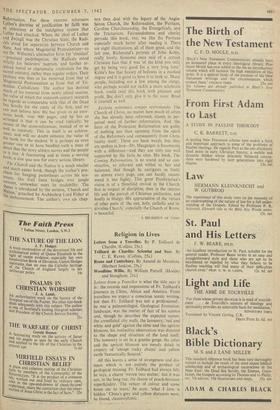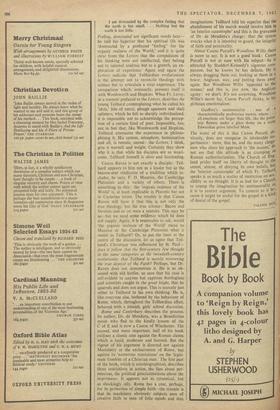Religion in Lives
Letters from a Traveller. By P. Teilhard de Chardin. (Collins, 25s.)
Teilhard de Chardin: Scientist and Seer. By C. E. Raven. (Collins, 25s.) Letters from a Traveller is what the title says it is: the records and impressions of Fr. Teilhard's journeys in China, Africa and America. From travellers we expect a conscious scenic writing, but then Fr. Teilhard was not a professional: he was a paleontologist. Geological formation, landscape, was the matter of fact of his science and, though he describes the expected scenes. the crenellated city walls, the lamasery, 'red and white and gold' against the elms and the apricot blossom, his instinctive observation was directed to the shape and structure of the land itself. The lamasery is set in a granite gorge, the cities and the apricot blossom are merely detail in country of 'abrupt rocky chains' and yellow earth 'fantastically fissured.'
All this leaves a sense of strangeness and dis- tance which is not entirely the product of geological training. Fr. Teilhard had always felt, he says, a charm 'woven into matter,' but it was not, in the long run, the charm of peach-blossom superficiality. 'The veneer of colour and scene bores me to tears,'- he says; 'what I love is hidden.' China's grey and yellow distances were. he f6und, claustrophobic
I am dominated by the complex feeling that the earth is too small. . . . Nothing but the earth is too little.
Feeling, dominated are significant words here— he told his Superior that his spiritual life was `dominated by a profound "feeling" for the organic realness of the World,' and it is quite clear from the Letters that the compulsions of his thinking were not intellectual, they belong not to rational analysis but to a growth, an ex- ploration of experience. Again and again the Letters indicate that Teilhardian evolutionism is the attempt not to reconcile theology with science but to articulate a total experience. The comparison which, insistently, presents itself is with Wordsworth and Hopkins. When Fr. Leroy, in a memoir prefaced to the Letters, describes the young Teilhard contemplating what he called his `idols,' bits of metal, plough spanners and shell splinters, which he felt as sharply individualised, it is impossible not to acknowledge the percep- tion of a certain kind of poet. Impossible, too, not to feel that, like Wordsworth and Hopkins, Teilhard attenuates the experience in philoso- phising it. His system, noosphere, hominisation and all, is remote, unreal: the Letters, I think, give it warmth and weight. Certainly they show why it is that while his disciples are so weari- some, Teilhard himself is alive and fascinating.
Canon Raven is not exactly a disciple: Teil- hard appears to him not as a leader but as the heaven-sent vindicator of a tradition which in- cludes, he says, F. D. Maurice, the Cambridge Platonists and a variety of others. There is something in this : the 'organic realness of the World' is, at least, explicable in Platonic but not in Cartesian terms. The trouble is that Canon Raven will have it that this is not only the true theology, but the true science: Bacon and Newton and so on were a mistake. This may be so—but we need some evidence which he does not supply. Again, it is reasonable to ask, would 'the organic realness of the World' mean to Maurice or the Cambridge Platonists what it meant to Teilhard? Or, to put the issue at the centre of the discussion, let us agree that Teil- hard's Christique was influenced by St. Paul— does it follow that the first-century Jew thought in the same categories as the twentieth-century evolutionist, that Teilhard is merely recovering the true deposit of the Faith? Perhaps, but Dr. Raven does not demonstrate it. He is so ob- sessed with old battles, so sure that his case is self-evident to anyone but captious theologians and scientists caught in the great blight, that he quarrels and does not argue. This is scarcely just either to Teilhard to his own thinking. He is, like everyone else, bothered by the behaviour of Rome, which, throughout the Teilhardian affair, behaved with a missish, girls' school discretion.
Rome and Canterbury describes the process. Its author, Dr. de Mendieta, was a Benedictine monk who fled to the kindly bosom of the C of E and is now a Canon of Winchester. The second, and more important, half of his book outlines a classic case against the Roman claims which is lucid, moderate and learned. But the vigour of his argument is directed not against Mariolatry or the exclusiveness of Rome, but against its 'numerous restrictions' on the 'legiti- mate freedom of a Christian man.' The first part of the book, which is autobiographical, describes those restrictions in action, the fuss about per- missions, the political procrastinations about the imprimatur. It appears not as tyrannical, but as shockingly silly. Rome has a case, perhaps, for its protection of simple faith—the trouble is that its machinery obviously subjects men of creative faith to men of little minds and thin imaginations. Teilhard told his superior that the abandoment of his search would involve him in 'an interior catastrophe' and this is the gravamen of Dr. de Mendieta's charge: that the system wrecks what it is intended to guard, the integrity of faith and personality.
About Canon Purcell's Woodbine Willie there is more to say. It is not a good book: Canon Purcell is not at ease with his subject—he is attracted by Studdert-Kennedy's vigorous com- passion, but he knows he has defects. He is always dragging them out, looking at them in a brave, Anglican, way, and putting them awaY again. But Woodbine Willie `appealed to the masses,' and this is, just now, the Anglican agony: we don't. It's not surprising. Woodbine Willie's secret lay, Canon Purcell thinks, in his plebeian emotionalism:
Geoffrey's sentimentality . . . was of a
characteristically proletarian variety, where • • all emotions are larger than life, like the porce- lain flowers under a glass dome on a sootY Edwardian grave labelled Mum.
The worst of this is that Canon Purcell, ob- viously, does not recognise its intolerable 1111" pertinence: more, that he, and the many clergy- men who share his approach to `the masses,' do not sec that this attitude is as cramping as Roman authoritarianism. The Church of Eng" land prides itself on liberty of thought to the, extent, almost, of denying its own beliefs, but, the 'interior catastrophe' of which Fr. Teilhard, speaks is as much a matter of restriction on sen- sibility as on thought. It is as bad for a Church, to cramp the imagination by sentimentality as, it is to restrict argument. To consent to it he cause it might be useful for the gospel is a kind of denial of the gospel.
VALERIE Pat.







































 Previous page
Previous page